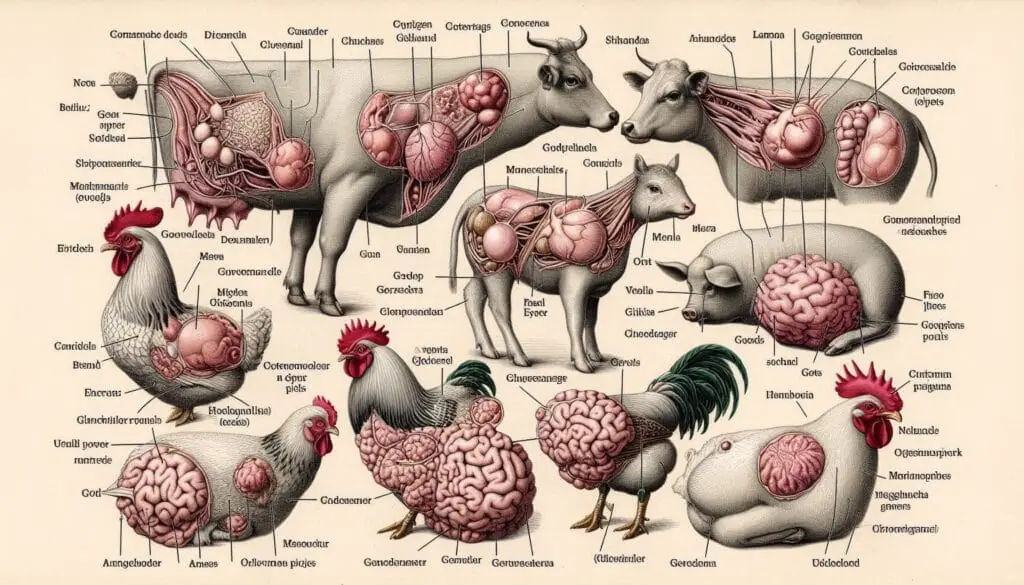Managing Rumen Disorders Effectively

Understanding Rumen and Fore Stomach Disorders
The rumen is a vital part of the digestive system in ruminants. It houses billions of microbes that aid digestion. Disruptions can lead to severe health issues, affecting weight gain, milk production, and overall well-being.
Common Rumen Disorders
Several conditions affect the rumen and fore stomach. These include:
Rumen Acidosis (Subacute and Acute) – Causes and Symptoms
- High-grain diets lead to excessive fermentation, producing lactic acid.
- Symptoms include decreased appetite, diarrhea, and bloating.
- Learn more: Effects of acidosis on cattle
Bloat – A Life-Threatening Condition
- Occurs due to excessive gas accumulation in the rumen.
- Frothy and free-gas bloat are the two major types.
- Read more: Understanding Bloat in Cattle
Rumen Impaction and Its Prevention
- Results from the consumption of indigestible material or inadequate water intake.
- Prevent by ensuring a fiber-rich diet and proper hydration.
- More info: Rumen impaction causes and solutions
Dietary Control for Optimal Rumen Health
A well-balanced diet is essential to prevent rumen disorders. The right mix of fiber, protein, and carbohydrates maintains microbial balance.
Key Dietary Strategies
Importance of Fiber in Rumen Function
- Long-stemmed fiber stimulates chewing and saliva production.
- Neutral detergent fiber (NDF) should be between 18-20%.
- Source: Role of Fiber in Rumen Health
Transitioning Diets Slowly
- Sudden diet changes disrupt microbial populations.
- Introduce new feed gradually over 7-10 days.
- More info: How to transition cattle feed properly
Avoiding High-Concentrate Diets
- Excessive grains lower pH, causing acidosis.
- Maintain a proper forage-to-concentrate ratio.
- Read: Dangers of high-grain diets
Medical and Probiotic Interventions
Veterinary assistance is crucial when dietary control isn’t enough. Probiotics, buffers, and medications help restore rumen function.
Probiotics for Rumen Stability
Benefits of Probiotics in Cattle
- Enhance microbial balance and immunity.
- Reduce the risk of acidosis and bloating.
- Source: Probiotics for Cattle Health
Using Buffers Like Sodium Bicarbonate
- Stabilizes rumen pH.
- Essential for high-producing dairy cattle.
- Read: Buffers in Dairy Nutrition
Veterinary Treatment Options
When to Call a Veterinarian
- Persistent bloating, weight loss, or reduced milk yield.
- Severe acidosis cases require IV fluids and antibiotics.
- Learn more: Emergency cattle care
Monitoring and Long-Term Rumen Health
Prevention is always better than cure. Regular monitoring and good management practices keep rumen disorders at bay.
Best Practices for Preventing Rumen Disorders
Regular Body Condition Scoring (BCS)
- Helps detect early signs of digestive issues.
- BCS should be maintained between 3-3.5 for optimal health.
- Read: Understanding BCS in Cattle
Providing Fresh, Clean Water
- Prevents impaction and supports digestion.
- Cows need at least 30-50 liters per day.
- More info: Water needs in cattle
Observing Feeding Behavior
- Watch for changes in appetite or cud-chewing activity.
- Decreased chewing can indicate acidosis risk.
- Read: Signs of rumen dysfunction
Conclusion
Rumen disorders can have severe consequences if not managed properly. Providing a fiber-rich diet, making gradual feed changes, using probiotics, and seeking veterinary care when needed are essential steps. Monitoring feeding habits and maintaining overall herd health will ensure high productivity and well-being.
More From Animal Diseases:






Responses